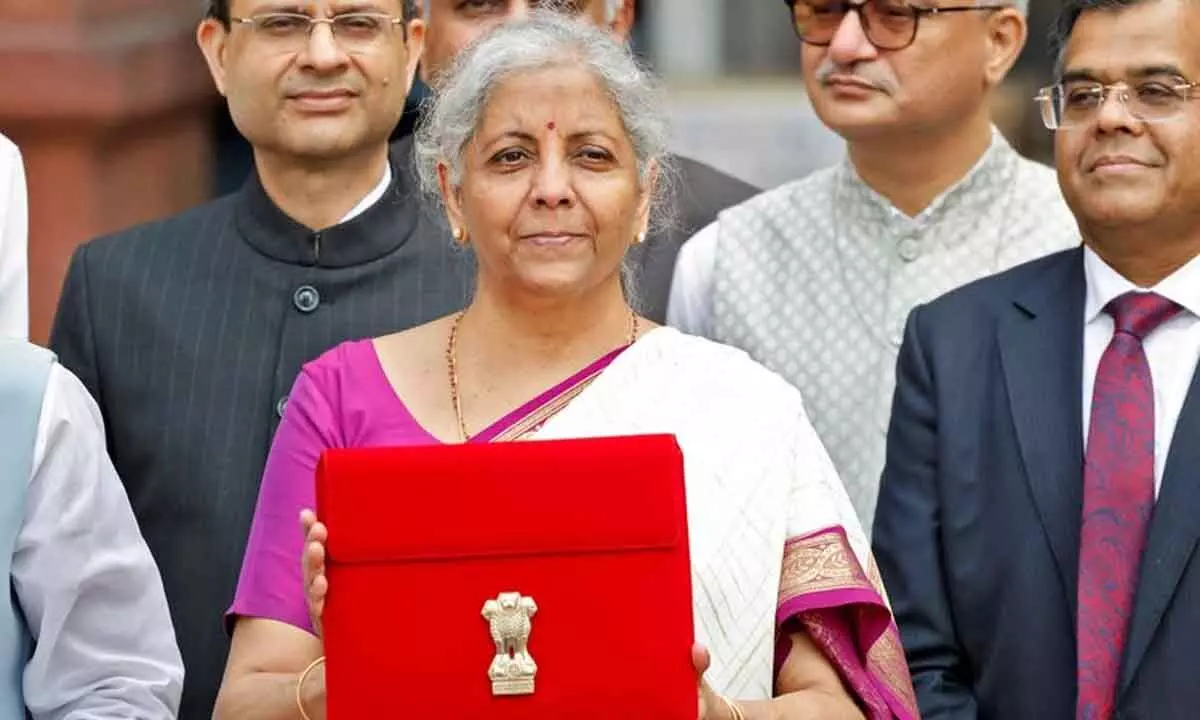Live
- Two officials held for collecting money from trucks on NH
- Majhi bats for disaster-resistant infra
- Grand Celebration of Constitution Day at District Police Office
- Constitution Day and National Law Day Celebrated with Enthusiasm at Gadwal PG Center
- Constitution Day Celebrated in Aija: Leaders Highlight Ambedkar’s Vision and Fundamental Rights
- Gadwal BJP Celebrates 75th Anniversary of Indian Constitution with Floral Tributes to Dr. B.R. Ambedkar
- Seal of authenticity for JK crafts by WCC soon
- The online world isn’t always safe
- Markets end in red as weak global cues weigh
- MyVoice: Views of our readers 27th November 2024
Just In

- Sitharaman's 7th Budget rewards allies, taxpayers
- Gives big push for jobs, skilling, women and youth
New Delhi: Union Finance Minister Nirmala Sitharaman on Tuesday said the Union Budget 2024 reflects Centre’s sustained efforts for ‘Viksit Bharat’ (developed India). She announced the Prime Minister’s package of five schemes for employment, skilling and other opportunities and said the government’s focus is on four major classes – the poor, women, youth and farmers.
“People of India have reinforced their faith in the government led by PM Narendra Modi and re-elected it for the third term. India’s economic growth continues to shine while the global economy is still in the grip of policy uncertainty,” she said, while presenting her seventh consecutive budget, breaking the record of former prime minister Morarji Desai.
She also announced income tax relief for the middle class, a Rs 2 lakh crore outlay for job creation schemes over the next five years and a spending splurge for states run by her party's new coalition partners as she unveiled the Modi 3.0 government's first budget after the general election.
With rural distress and unemployment being blamed for the Bharatiya Janata Party losing its majority, Sitharaman in her budget provided Rs 2.66 lakh crore for rural development and maintained spending on long-term infrastructure projects at Rs 11.11 lakh crore to boost economic growth. She abolished 'angel tax' for all classes of investors in startups, cut customs duty on mobile phones and gold and simplified capital gains tax. She, however, raised the securities transaction tax (STT) on futures and options of securities, which led to tanking of stock markets. "India's economic growth continues to be the shining exception (in a world that is gripped by policy uncertainties) and will remain so in the years ahead," she said. "In this budget, we particularly focus on employment, skilling, MSMEs, and the middle class."
Besides Rs 2 lakh crore provided over a five-year period for schemes and initiatives to facilitate employment, skilling and other opportunities for 4.1 crore youth, “I have made a provision of Rs 1.48 lakh crore for education, employment and skilling,” she said.
For Bihar, where Assembly elections are due next year, the Finance Minister announced spending of Rs 60,000 crore on infrastructure projects like expressways, power plant, heritage corridors and new airports. The support to Bihar, whose ruling party and BJP’s partner Janata Dal-United has been demanding an economic package and special category status for the state, is in the form of capital projects but not subsidy or cash dole.
Similarly, for Andhra Pradesh, whose ruling Telugu Desam Party recently joined the BJP-led National Democratic Alliance, she allocated Rs 15,000 crore in financial aid through multilateral agencies. A similar request for support to Bihar will be expedited, she said.
For the middle class, she raised standard deduction -- a flat deduction from total salary earned by an employee in a year before calculating applicable income tax rate -- by 50 per cent to Rs 75,000 and tweaked tax slabs for taxpayers opting for the new income tax regime.
To spur employment, the Budget provided for incentives for companies, including paying for one-month salary for first-time employees, incentive at specified sale to both employee and empower with respect to their retirement fund contribution in the first four years of employment and reimbursing employers up to Rs 3,000 per month for 2 years towards EPFO contribution of each additional employee. Also, a programme to improve skills as well internship for students and subsidised loans for higher education will be provided, she said.
India’s official unemployment rate in urban areas is pegged at 6.7 per cent but private agencies put it at much higher levels. Buoyed by robust tax collections and a higher-than-expected dividend receipt from the Reserve Bank, Sitharaman said the government’s fiscal deficit -- the difference between the total revenue earned and total expenditure -- will be trimmed to 4.9 per cent of the GDP in 2024-25, below the 5.1 per cent figure estimated in the interim budget she presented in February.
She reduced gross market borrowing marginally to Rs 14.01 lakh crore.

© 2024 Hyderabad Media House Limited/The Hans India. All rights reserved. Powered by hocalwire.com







